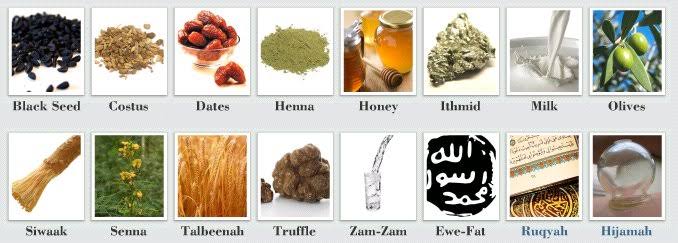Prophetic medicine, also known as “Tibb al-Nabawi,” refers to remedies and practices that are believed to have been recommended by the Prophet Muhammad (peace be upon him) for maintaining good health and well-being. While these practices are mentioned in various hadiths (sayings and actions of the Prophet), it’s essential to note that their effectiveness may vary, and individuals should consult with healthcare professionals for any health concerns. Here are ten prophetic medicines that some Muslims choose to incorporate into their daily routines:
1. Honey: The Prophet Muhammad recommended honey for its various health benefits, including its antibacterial properties. It can be taken with warm water or used as a natural sweetener.
2. Black Seed (Nigella Sativa): Black seed is believed to have multiple health benefits. It can be taken as a supplement or used in cooking.
3. Olive Oil: Olive oil is praised for its health benefits in Islamic tradition and is often used in cooking or as a salad dressing.
4. Dates: Dates are a nutritious food and were often consumed by the Prophet Muhammad as a natural energy source. They are commonly eaten during iftar (breaking the fast) in Ramadan.
5. Ajwa Dates: Ajwa dates are a specific type of date believed to have special healing properties. Some Muslims consume them daily based on the Prophet’s recommendation.
6. Cupping (Hijama): Cupping therapy is a traditional practice where cups are placed on the skin to create suction. It is believed to have various health benefits and can be performed regularly.
7. Miswak (Siwak): The miswak is a teeth-cleaning twig made from the Salvadora persica tree. Using it for oral hygiene is recommended in Islam and can be done multiple times a day.
8. Aloe Vera: Aloe vera is known for its soothing properties and is mentioned in some prophetic traditions. It can be used for various skin and digestive issues.
9. Fasting: Fasting, particularly intermittent fasting, is recommended as a way to improve overall health and discipline. Muslims fast during the month of Ramadan and can also practice voluntary fasts on other days.
10. Prayer and Dhikr (Remembrance): Engaging in regular prayer (Salah) and remembrance of Allah (Dhikr) are considered spiritually and mentally beneficial practices that can contribute to overall well-being.










